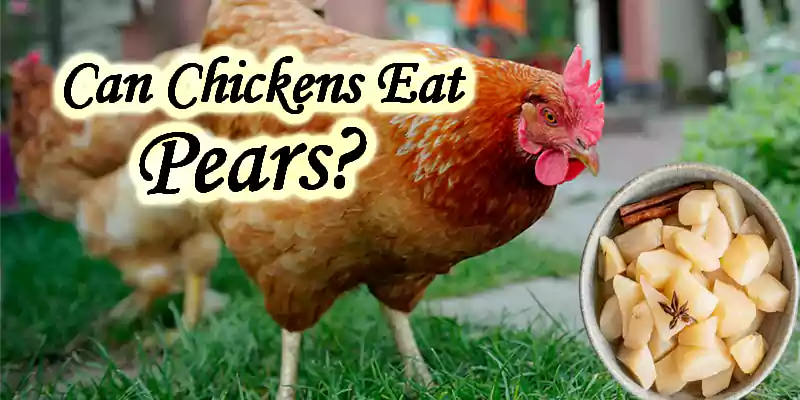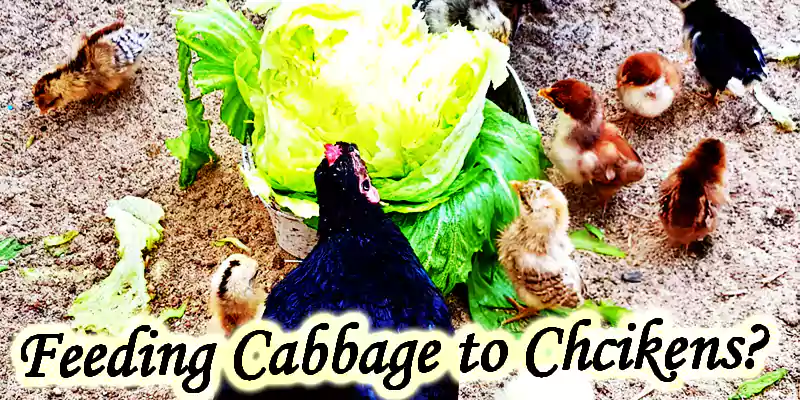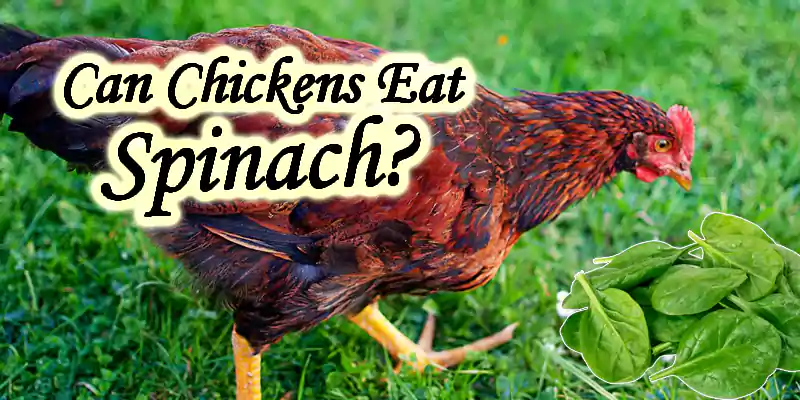Can Chickens Eat Pears? Must-Know Facts for Flock Keepers
Published: 10 Nov 2024
Every chicken keeper wants to make their flock happy and healthy. We can’t achieve the goal by offering random diet to chickens. Pear is considered a delicious and nutrient-rich fruit for humans. Birds have more delicate digestive systems; one wrong bite can cause fatal problems to feathered friends. The same is the case with Pears.
This guide will explain the benefits and risks of feeding the flock pears. This guide will enable you to make logical decisions about feeding pears to your flock.

Can Chickens Eat Pears? Must-Know Facts for Flock Keepers
Are Pears Safe for Chickens?
This is the most chanted query regarding the pears. Yes, pears are safe for them if following some basic precautionary steps. Pears contain a wide array of nutrients that support the overall growth of flock. To ensure the safety of your flock, pears should be served to chickens sparingly. A small portion of the toxic compound can be removed with proper preparation.
Nutritional Content of Pears
The second important factor about chicken’s feed is its nutritional value. Chickens have their particular requirements for nutrients in their feed. Here is a brief overview of nutrients available in Pears.
- Fiber Content: Pears contain soluble and insoluble dietary fiber. It promotes the gut health. Relieves the constipation upset and works as a blood sugar regulator.
- Vitamin C: Vitamin C is supportive to boost the immune system in birds. It will help to reduce the diseases and improve collagen production.
- Vitamin K: Vitamin is essential for bleeding control. It also supports bone health and reduces the fracture probabilities.
- Vitamin A: Vitamin A is crucial for improving vision and cell growth. It ensures healthy skin and mucous membranes in the flock.
- Potassium Content: Pear is a good potassium content source, which balances the electrolyte balance. It is beneficial for muscle functions.
- Copper Content: Pears contain a high volume of copper content. It produces red blood cells and provides oxygen supply to other parts of the body.
- Folate: Pear is helpful for cell division. It improves nerve functions in chickens. It keeps them healthy and happy with energy.
- Magnesium: Pear has a small quantity of magnesium, suitable for energy production and muscle development.
- Calcium: Pears offer a trace aid of calcium content. It is helpful for bone formation and feather growth in chickens. It improves eggshell quality.
How to Feed Pears to Chickens?
It is essential to feed pears to chickens in an engaging way. They shouldn’t get bored with a monotonous diet schedule. Here are some precautionary steps to make pears safe and entertaining:
- Select Fresh Pears: Choosing ripe and fresh pears is essential. Never use a pear if there are signs of spoilage or overripe spots.
- Thoroughly Wash Pears: Pesticide residues and dirt on pears are likely. Contamination is one of the major concerns for digestion issues.
- Remove Seeds: The study shows pear seeds contain a minute of cyanide content. To prevent toxicity and choking, you should remove seeds.
- Serve in Bite-Size Pieces: Larger pieces of pears may cause choking issues. It is more challenging to peck at whole pears than small pieces.
- Occasional Treat: Pear is not a primary diet but a treat. Overfeeding will cause digestive upset and nutritional imbalance.
- Monitor their Reaction: After serving pears to your flock, observe their response. Adjust the portion of pears into the routine diet accordingly.
Can Baby Chickens Eat Pears?
Yes, chicks can have pears in moderation with caution. Baby chickens are more prone to diseases like diarrhea. Therefore, we advise you to offer pears to chicks after 6 weeks of age. Chop them into small pieces according to the age and size of your flock. It will prevent blockage issues. Proper decontamination of chicks’ feed is crucial to make them healthy and happy. Introduce in small amounts and observe their reaction. Adjust the feed according to their interest.
How Much Pears Can Chickens Eat?
Quantity and frequency of feeding pears to chickens are critical factors. We have to limit its portion to under 5% of the total diet offered to the flock. Daily intake of pears is not recommended for the growing flock. It will disturb their digestion and nutritional balance. You can provide pears twice a week to your flock. It contains a good volume of sugar content. So, always ensure the moderation.
Can chickens eat pear Leftovers?
Yes, pear leftovers are not harmful to them. It should not be moldy. Remove seeds and stiff stems to avoid difficulty in the consumption process. The pear leftover should not be overripe or fermented. Fermented or overripe pear leftover is harmful to chicken’s health. You can serve fresh leftovers in moderation.
Can Chickens Eat Overripe Pears?
No, overripe pears are hazardous for your clucking friends. It will soon start fermenting which is disastrous for the flock. Some chickens will show annoyance with these overly soft pieces of pears. So, discard the overripe part of the pears and serve properly ripe parts.
Benefits of Eating Pears for Chickens
Pears contain a wide range of beneficial nutrients for optimal growth and development. Here are the typical advantages of serving pears:
|
Potential Risks of Feeding Pears to Chickens
There are some concerns for chicken enthusiasts to serve pears to the flock. It is helpful to identify the signs and symptoms of anything unusual. Here are some common clues that indicate something irregular.
|
What are the Edible Parts of Pears for Chickens?
Can Chickens Eat Pear Skin?
Yes, chickens can have pear skin with precautionary measures. There is a probability of choking because of the hardness of the skin. Pear skin offers some nutritional value. It provides a good value of fiber content which assists the digestion process. It is mandatory to decontaminate the outer surface of pear skin to prevent diarrhea and other diseases. Serve pear skin in small pieces to avoid hurdles in pecking them.
Can Chickens Eat Pears Seeds?
No, pear seeds are not beneficial for chickens. Seeds contain toxic compounds like cyanide, which can harm chicken health. There is a trace content of cyanide in pears. Still, we are not in favor of feeding pear seeds. So, remove the seeds and serve safe parts of the pears to the flock.
Can Chickens Eat Pear Flesh?
Yes, in moderation, pear flesh is a safe and healthy diet. They love to peck at the soft flesh of soft flesh. It offers nutrients like fiber, vitamins, minerals, and antioxidants. It has a decent amount of water content, which supports to maintain appropriate hydration. To make it safe for young birds, serve it in small pieces. Ensure moderation in any case.
Can Chickens Eat Pear Leaves?
No, we are in favor of feeding pear leaves to chickens. Pear leaves are not safe and healthy for them. There are some harmful compounds in pear leaves that release cyanide. It will lead to toxic illness in the flock. We should not serve hazardous diet even if it has good nutritional value. So, refrain from feeding pear leaves to our beloved clucking friends.
Can Chickens Eat Pear Stems?
No, they should not eat pear stems. The stems are the more challenging part of the pear plant and are difficult to consume. We have never recommended a fibrous diet for the flock. Pear stems also contain trace content of the toxic compound “cyanide.” So, to keep our flock safe and healthy, avoid serving pear seeds, leaves, and stems. Instead prefer to offer small pieces of pear flesh to chickens in moderation.
Can Chickens Eat Pear Core?
Yes, chickens can have pear core in moderation. It offers several nutritional benefits. It is delicious than other parts of pear and they love to peck at it. You should cut it into small pieces to make it more convenient and easier to swallow and digest. Always keep its portion under 5% of the routine diet of the flock. Otherwise, there is a threat of nutritional imbalance.
In which Form Chickens Like Pears?
Can Chickens Eat Raw Pears?
Yes, chickens can have raw pears. Raw pears is a safe and healthy feed. It contains vitamins (A, C, and K), minerals (calcium, potassium, and magnesium), fiber, and antioxidants. It is suggested to remove seeds that contain cyanide content. Cut them into manageable pieces to prevent choking issues. Always serve raw pears in moderation.
Can Chickens Eat Boiled pears?
Yes, chickens can have boiled pears in limited volume. The boiling process of pears makes them softer and easier to digest. It is observed that heat during boiling will reduce the nutritional value of pears. It is highly recommended not to use additives or seasonings during the boiling process of pears. The addition of sugar or spices is harmful to them. Keep its portion to a minimum level.
Can Chickens Eat Unripe Pears?
No, unripe pears are not recommended for chickens. Unripe pears have a high volume of tannins that can cause severe health issues to the flock. It is the main reason for diarrhea and other digestive problems. Additionally, unripe pears have a bitter or less sweet taste with a hard texture, which will not make your flock happy. So, avoid serving unripe pears to your flock.
Can Chickens Eat Whole Pears?
No, we will not recommend the use of whole pears to chickens. It will lead to blockage or choking issues. Additionally, whole pears are challenging to consume. Therefore, we recommend you cut the pears into pieces. Serve them in moderation to prevent nutritional deficiency.
Can Chickens Eat Canned Pears?
Yes, chickens can have canned pears with some caution. It is not an ideal diet for their growth. As per our experience, canned pears are available with added sugar and preservatives. These additives are harmful to their health. If you want to serve canned pears, then rinse them thoroughly, ensure minimum additives, and offer in moderation.
Can Chickens Eat Fresh Pears?
Yes, chickens can have fresh pears in moderation. It is a pre-requisite for pears to qualify as the chicken’s diet. We have suggested an occasional intake of pears. It is better to cut fresh pears into small pieces that are easier to consume. Decontamination is crucial to prevent digestive issues. Keep its portion under 5% of the routine diet of your flock.
Can chickens eat uncooked pears?
Yes, chickens can have uncooked pears in moderation. Uncooked pears should be served after following the critical preparation steps mentioned above. Removing seeds is essential to make it a safer and healthier diet. Excessive intake of uncooked pears will lead to digestive issues and nutritional deficiency in growing chicks. So, offer them in limited volume.
Can Chickens Eat Wild Pears?
No, we do not favor serving wild pears to the clucking birds. Wild pears contain higher levels of toxins like cyanide. It can hurt a chicken’s health. We recommend you offer fresh, safe, and nutritious fruits as an occasional diet of chickens instead of wild ones.
What Type of Pears Can Chickens Eat?
Can Chickens Eat Red Pears?
Yes, chickens can eat red pears in moderation. Red pears are one of the safer and more nutritious varieties of pears available across the world. It provides nutrients like vitamins, fiber, and antioxidants in reasonable amounts. We advise you to remove seeds before serving them. Furthermore, leaves and stems of red pears are not recommended due to toxic compounds like cyanide.
Can Chickens Eat Nashi Pears?
Yes, chickens can enjoy nashi pears sparingly. It is also called Asian pears. It is a safe and healthy type of pear. It offers vitamins, minerals, and fiber essential for overall growth. The nashi pears are crispy with a mild, sweet flavor. They love to peck at them while running around their coop. Like other types of pears, remove the seeds of nashi pears.
Can Chickens Eat Cactus Pears?
Yes, chickens can have cactus pears with caution. It offers essential nutrients for the optimal growth. The skin of cactus pears has tiny spines, which can harm their health. So, remove the skin and seeds before serving cactus pears to them. Offer them in small, manageable pieces to make things easier for young birds. Never compromise on the moderation rule.
Chickens Eat Bradford Pears?
No, chickens can’t have Bradford pears due to various reasons. They are known for poor quality, unpleasant flavor, and fibrous texture. They have shown zero interest in it. Additionally, Bradford pears contain high levels of cyanogenic compounds which are fatal for poultry. Poultry experts have noticed the negative impact of this variety on the environment. So, never serve it to your flock.
Alternative to Pears for Chickens
Several options in fruits and vegetables offer nutritional benefits to chickens as an occasional diet. If you are looking for alternatives to Pears then consider these fruits and vegetables:
- Apples: Apples contain essential nutrients like fiber, vitamins, and antioxidants. Remove the seeds because of cyanide content. Additionally, apples contain a high water content, which helps to prevent dehydration.
- Berries: They love to have the sweet, juicy flavor of Berries. There are a variety of Berries available in the market. Raspberries, mulberries, blackberries, and blueberries are recommended. It offers helpful antioxidants.
- Peaches: Peach is a fruit full of vitamins A and C with good value of dietary fiber. These nutrients are highly beneficial for their growth. We recommend removing the pits that contain cyanide compounds.
- Plums: Plums offer a wide range of healthy nutrients. You have to prepare them properly before serving them to the birds. Removing the pits is an essential step in their preparation. They love to peck at raw plums.
- Bananas: Bananas are known for their nutrient-rich properties. They offer a high value of potassium, which is essential for the muscle development. They provide instant energy to them with carbohydrates.
- Grapes: Pecking at grapes is a fun activity for chickens. It will help to reduce mental stress. Vitamin C and K are readily available in grapes. They will diversify the chicken’s diet. Offer in moderation.
- Cantaloupe: Cantaloupe is a nutritious diet of flying birds. It offers vitamins A and C. High water level helps them to stay cool in summer. We suggest cantaloupe flesh for chickens in moderation after the removal of seeds.
- Watermelon: Watermelon offers the same benefits as cantaloupe. It is full of water content which prevents dehydration problems. It provides vitamins A, C, and B6.
- Carrot: It is a healthy vegetable. It improves the vision with beta-carotene content. Carrots can be served in both raw and cooked form. Always cut them into small, manageable pieces for chickens.
- Pumpkin: Pumpkin is high in fiber content which is good for digestion. They can have pumpkin’s flesh and seeds in moderation. Pumpkin seeds offer proteins that are good for muscle functions.
Conclusions
Yes, chickens can eat Pears in moderation. They are enjoyable, nutritious, and hydrating for poultry birds. Pears offer vitamins, fiber, and antioxidants to backyard friends. These are valuable nutrients that support digestion, boost the immune system, and help the overall growth of chicks.
We recommended Pears as an occasional diet. Removing seeds, leaves, and stems of Pears before serving them to your flock is mandatory. These parts contain a trace value of cyanide, which can result in toxicity. Introduce gradually and observe the response of the flock. Adjust the quantity of pears according to the reaction of backyard birds.

- Be Respectful
- Stay Relevant
- Stay Positive
- True Feedback
- Encourage Discussion
- Avoid Spamming
- No Fake News
- Don't Copy-Paste
- No Personal Attacks

- Be Respectful
- Stay Relevant
- Stay Positive
- True Feedback
- Encourage Discussion
- Avoid Spamming
- No Fake News
- Don't Copy-Paste
- No Personal Attacks


